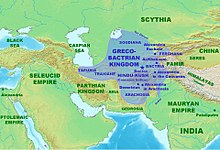تاپوری
ڕواڵەت


تاپوری یان تاپیری ھۆزێک بوون لە مادەکان، باشووری دەریای قەزوین، کە بەتلیمۆس و ئاریان باسیان کردوون.[١] سیتێسیاس ئاماژەیە بۆ خاکی تاپوری کە دەکەوێتە نێوان زەوییەکانی گیلان و گۆرگان. وتای تەبەریستان بە زمانی تەبەری ئەو شوێنەیە کە خەڵکی تاپوری تێیدا دۆزراونەتەوە، و گەلێکن کە لە نێوان جاگرم و سەفیدرود لە پارێزگای گیلان دەژین.[٢]
سەرچاوەکان
[دەستکاری]- ^ «Dictionary of Greek and Roman Geography, illustrated by numerous engravings on wood. William Smith, LLD. London. Walton and Maberly, Upper Gower Street and Ivy Lane, Paternoster Row; John Murray, Albemarle Street. 1854. ,TAPU´RI». www.perseus.tufts.edu. لە ڕەسەنەکە لە 2 يونيو 2022 ئەرشیڤ کراوە. لە ٤ی شوباتی ٢٠٢١ ھێنراوە.
{{cite web}}: نرخەکانی ڕێکەوت بپشکنە لە:|ڕێکەوتی ئەرشیڤ=(یارمەتی) - ^ Of the lands which lie on the sea and of the others which border on these, Ninus subdued Egypt and Phoenicia, then Coele-Syria, Cilicia, Pamphylia, and Lycia, and also Caria, Phrygia, and Lydia; moreover, he brought under his sway the Troad, Phrygia on the Hellespont, Propontis, Bithynia, Cappadocia, and all the barbarian nations who inhabit the shores of the Pontus as far as the Tanais; he also made himself lord of the lands of the Cadusii, Tapyri, Hyrcanii, Drangi, of the Derbici, Carmanii, Choromnaei, and of the Borcanii, and Parthyaei; and he invaded both Persis and Susiana and Caspiana, as it is called, which is entered by exceedingly narrow passes, known for that reason as the Caspian Gates. 4 Many other lesser nations he also brought under his rule, about whom it would be a long task to speak. But since Bactriana was difficult to invade and contained multitudes of warlike men, after much toil and labour in vain he deferred to a later time the war against the Bactriani, and leading his forces back into Assyria selected a place excellently situated for the founding of a great city.. Diodorus Siculus, Library 1-7 (2.2.3)
| کۆمنزی ویکیمیدیا، میدیای پەیوەندیدار بە تاپوری تێدایە. |
